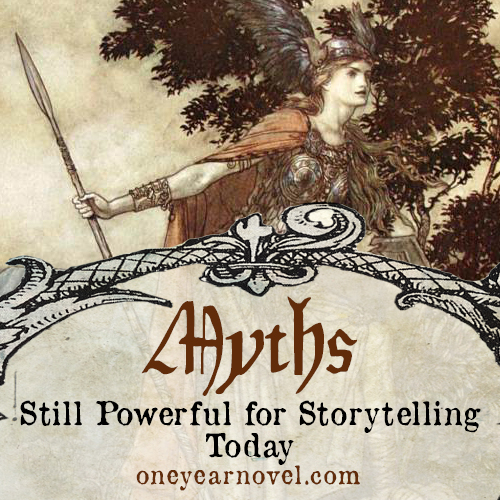Myths: Still Powerful for Storytelling Today
 Justin Ferguson, Guest Contributor
Justin Ferguson, Guest Contributor
Someone once told me that the reason we find stories to be universally appealing across time and cultures despite differing belief systems is that storytelling is inherently secular. I disagree. I believe the universal appeal of stories is that they are inherently religious. Why? Because religion is about understanding how we relate to the world beyond us and to ourselves—and so is story. The stories most important to us give us insight into who we are and why we are.
From the earliest days of the human race, we have told stories to make sense of ourselves, our world, and our place in it. Stories of the divine, of creation, of wars in the heavens, and falls from innocence. Stories to explain the nature of God, the universe, death, and eternity. These stories we call myths, and they were told not simply for entertainment, but to understand the nature of life on this planet.
Today the term “myth” has come to have several meanings. The most unhelpful is that a myth is “a story that is not true.” While correct in a simplistic sense, this meaning is useless to storytellers. By this definition, all fiction should be considered myth, and this robs myth of its particular potency.
A more accurate definition would be “a cultural story that explains reality.” How did this earth come to be? The gods fashioned it from the flesh of a primordial giant. Why do we have seasons? Because the goddess of agriculture and fertility withdraws her gifts from the world during the months in which she’s separated from her daughter. Why do we die? Because the cat sent to retrieve the potion containing eternal life left it with a tree while he took a bath (which is also why trees live so long and, presumably, why cats are no longer particularly fond of baths).
But even this definition falls short of explaining the real power of myth and why it still matters for us today. After all, these stories are no longer necessary to explain our world, and the religions some of them birthed are now extinct.
It has long been a source of intrigue and debate that many cultures across the world have similar stories—in many cases nearly identical. From trickster gods to god-men, from gods who die and rise again to children of gods who become divine, from loss of paradise through pride or deception to great floods destroying the earth, the parallels are astonishing. For Christians, the explanation is simple: we remember.
Tolkien coined the term “subcreator” to describe our role as storytellers made in the image of God. God, the supreme Author, created this Primary World in which He tells His Story through history; and we “subcreate” secondary worlds in which to tell our own stories in the image of His. As a result, these worlds and stories of ours are reflections in varying degrees of the world and Story we live in.
But myth is more than just a reflection of reality; it’s the memory of a specific reality that we have almost forgotten. There’s a reason why the atmosphere of a myth is almost universally remote. In myth we are remembering something we no longer have access to.
We remember imperfectly, and, more often than not, the stories we piece together out of our fragmented memories are little more than perverted echoes; but they still hold recollection of that Truth we once knew.
Why does this matter for us? Because as Christians our mission is redemption, and as Christian storytellers our special tool for that task is story. In Christ and the Gospel we see the fulfillment of all these myths: the God who became a man to save His fallen creation, died, returned to life, and united us to Him. In Tolkien’s words, “History and legend have met and fused.” Myth has become fact. And that colors our entire approach to stories.
We shouldn’t feel the least threatened by the similarities between Christianity and pagan myths. Instead we should embrace the points of connection and use them to affirm the Truth that we know. Growing up in a Christian home, I would often find myself jaded about the Bible and its stories. It wasn’t that I didn’t believe the stories, I’d just heard them so often that they’d lost their force. Learning to see Christianity in the myths of other cultures gave me a fresh perspective. I rediscovered the Truth. By tracing Christ in the death and eventual resurrection of the Norse god Baldur, for example, I found new appreciation for His beauty.
Secularization has not changed human culture as much as we might think. We still remember, and we still tell stories to explain ourselves and our world. We may have removed some of the more obviously religious language, but our stories are still religious.
What are our myths as a culture? How do they inform the way we live? Rather than simply trying to demolish these stories by denouncing them as lies, what memories of Truth can we find in them? These are what give the myths their power, and by affirming the Truth where we find it we have the opportunity to tell stories that draw particular attention to it.
And because Truth is universal through time and space, the old myths have not lost their relevance. Many beloved fantasy writers, like Tolkien and Lewis, retold their favorite myths in ways that highlighted the truths they noticed in them. We can do the same—even if we’re not writing fantasy.
What myths do you love? Why do they draw you? What archetypes do you find yourself returning to over and over again in your stories? Memories of Truth give these their weight, and by learning to recognize that Truth when you see it, you will be able to reveal it all the more effectively in your writing. And, perhaps most importantly, you will learn to love the Truth all the more.
…
Justin has been a student with The One Year Adventure Novel for several years and has been writing since he was a kid. He desires his stories to evoke wonder and longing in readers like his favorites do in him. He is a Texan who lived for many years in Canada and is now in Kansas. He’s in the process of collecting as many mythologies as are available. He also enjoys attempting to play the ocarina from time to time.




This is exactly what I’ve been learning! Thank you for this timely article and a better definition of what a myth is. 🙂
Keep on writing, brother in Christ!
Great encouragement and help in understanding Myths and enhancing common truths from them in our stories. Thanks!